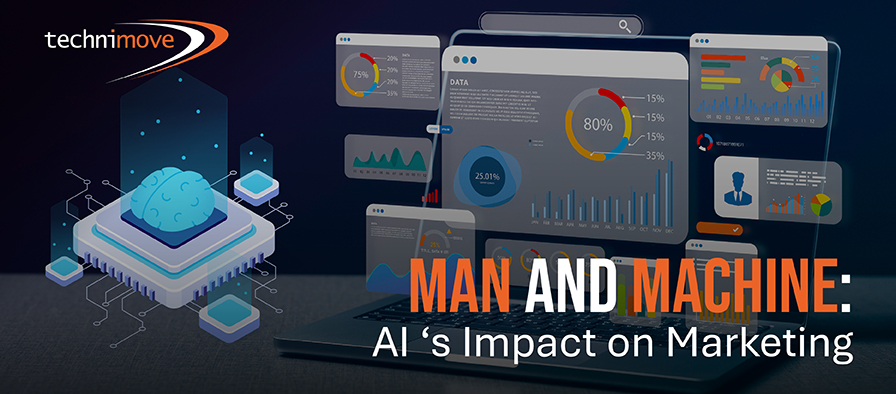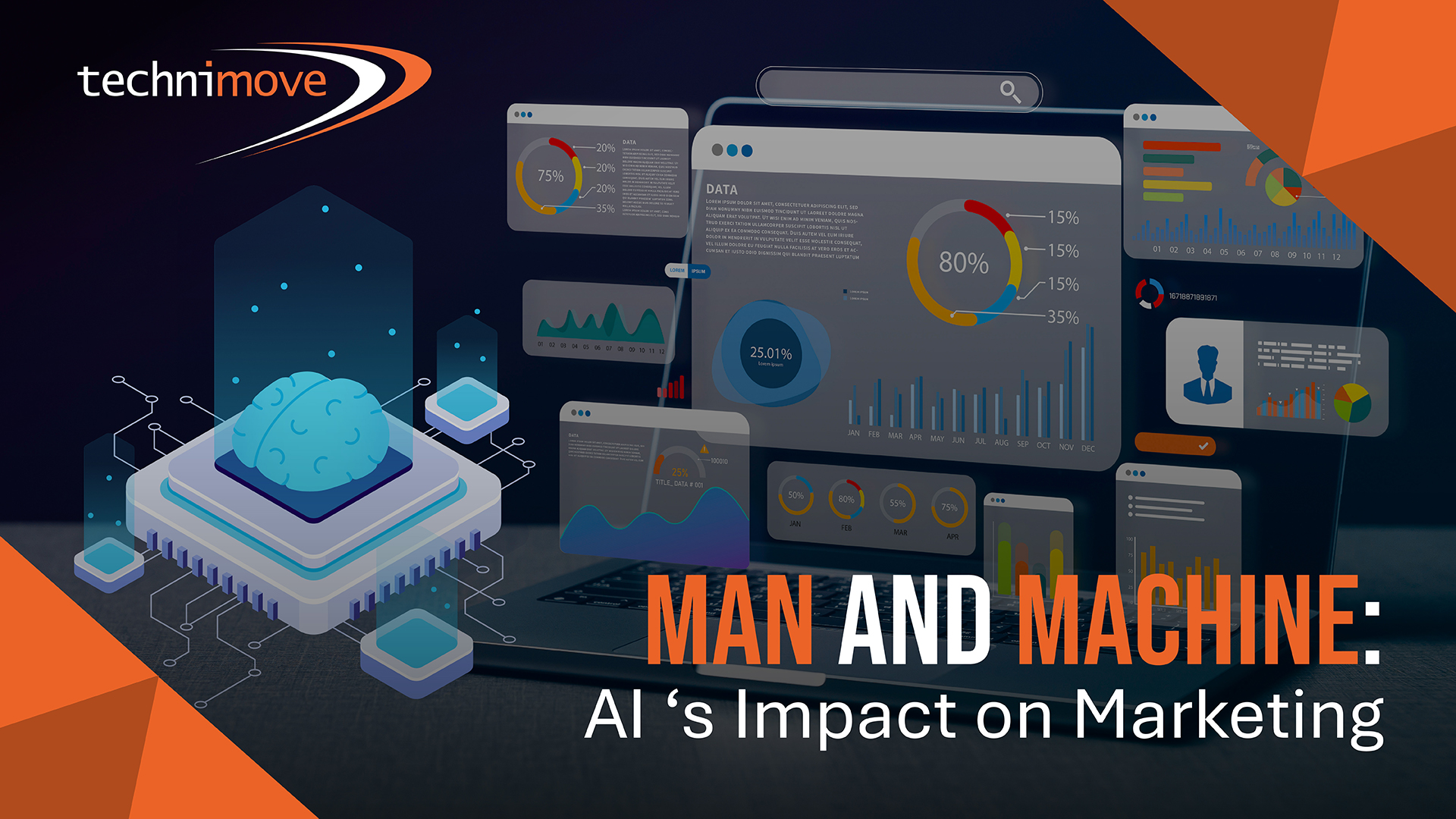Introduction
The rise of Artificial Intelligence has brought about a revolution in various industries, including marketing. In an ever-evolving landscape, businesses are turning to AI to power-up their marketing techniques, giving birth to a new breed of marketers — part human, part machine.
In this blog post – which may have possibly started like the plot of a rejected Terminator film – we’ll explore the impact of AI on some marketing techniques to unravel how AI is transforming the way businesses connect with their customers and dominate the marketing game.
It’s important to acknowledge the impact of AI in tech marketing (and marketing disciplines in general) as it’s becoming more prevalent in the sector and affecting the way marketing strategies are built and implemented.
Customer Insights
Forget your crystal balls and fortune tellers. AI-powered analytics tools have become the Sherlock Holmes of marketing, helping businesses unveil the mysteries of customer behaviour. To an extent.
With AI’s superhuman data-crunching abilities, marketers can dive deep into the treasure trove of consumer insights. They can spot trends, preferences, and even predict future behaviours with a precision that would make Nostradamus jealous. It’s like having a team of psychics, minus the crystal balls and mystical robes.
Armed with this knowledge, marketers can create campaigns that hit the bullseye, connecting with customers on a level that makes them wonder ‘Is this marketer a mind reader?’…or are they just tapping into a zeitgeist, leaning too much on something without human nuance, or even ‘cheating’.
What AI can’t factor in is the knowledge of your experienced company employees and how your customers react to specific scenarios, projects, and erm, financial conversations (ok, we’re talking about quotes and budgets here!). It can certainly offer valuable support, but AI is unable to paint that whole picture. And if you asked it to, it would still probably paint you as having 3 rows of teeth and 16 fingers.
Marketing Automation
Remember those mundane and repetitive marketing tasks that sucked the joy out of your workday? Well, AI-powered marketing automation is here to rescue you from the clutches of monotony! Or is it?
Picture having an army of tireless robot assistants who can handle customer inquiries with grace and efficiency. These chatbots are like the customer service superheroes, available 24/7 to answer queries, provide recommendations, and even crack a few jokes.
They are the guardians of customer satisfaction, the knights in shining algorithms, ensuring that no customer goes unheard or unattended.
What these tools can’t offer is genuine human empathy or understanding which is crucial in business and commercial transactions and relationship building.
As impressive as AI replies might be – a novelty even – it’s all too obvious and you’re all too aware that it’s a machine harvesting billions of threads of code and data to spit out the response it thinks will progress the interaction. There’s no guarantee it’ll hit the spot.
Personalised Marketing
Move over ‘one-size-fits-all’ marketing because AI is the wizard behind the curtain, concocting hyper-personalised marketing campaigns that make customers feel like they’ve had a private gig from their favourite band. However, there’s also the potential to receive a nagging earworm from a turgid one-hit wonder here too.
With AI, marketers can segment their audience into micro-segments, creating tailored messages that resonate with each individual. It’s like having a marketing butler who knows your every desire, serving up content that makes you go ‘How did they know?’
AI’s predictive powers take personalisation to a whole new level, with recommendations so spot-on, they make you wonder if the algorithm has psychic abilities. It’s marketing that’s so personalised, it feels like a friendly chat with an old friend (drinks, snacks, and embarrassing school stories optional).
The other side is that without the right input or understanding of the users’ intentions, responses can make the ears ring and the taste go bitter quickly. There’s still a lot of trepidation with embracing AI in the marketing community, so one bad experience might well sting for a while.
Replies can also prove cold or without personality. That’s obviously fine if you just want the facts, but for something more engaging, and maybe an interaction or result with a sense of humour, then it’s there’s an argument that AI isn’t quite there yet.
Considerations and Challenges
While AI brings a wave of innovation, we can’t ignore the caution signs along the road to marketing utopia.
As marketers ride the AI wave, they must ensure they’re not sacrificing consumer privacy in the process. There’s a fine balance between personalisation and respecting customers’ boundaries.
Marketers must also guard against bias in AI algorithms, avoiding any accidental blips that could make them the laughingstock of the marketing world by becoming too reliant and possibly even complacent with AI tools.
Human oversight is crucial to ensure AI-powered marketing techniques stay within ethical boundaries, creating experiences that delight customers without feeling like a creepy stalker.
How is it directly effecting my work?
AI has ushered in a new era of marketing, transforming marketers into a blend of human creativity and machine precision. It’s like having an artificially intelligent sidekick, ready to help marketers work out customer preferences, automate tedious tasks, and deliver great personalised experiences.
It’s important to be open-minded and look at the options available and consider possible collaborative ways of working when it comes to a game-changer like ChatGPT, for example, so that’s where we’re at right now at Technimove.
It’s as scary as it is exciting, but it finally feels ok to gradually lean into it a little more. It certainly helps me, as a humble marketer, create more efficiencies with content writing and generating ideas, and supports with informing and finessing blogs, case studies and social posts. It also helps me understand technical details of our services – which I don’t yet understand – and make them digestible and articulate them for a wider audience.
How is it impacting the sector?
We are seeing AI impact tech marketing through personalised content recommendations, chatbots for instant support, predictive analytics for data-driven decisions, and optimised email marketing.
Within the tech sector it’s evident with generating content, segmenting audiences, and continuously optimising campaigns – you see that ad following you around your social media platforms? That’s not by accident.
We are also seeing AI in customer engagement with visual recognition, content curation – which we are embracing here at Technimove – and marketing automation, which is an area we’re looking to explore further.
However, as with any adventure there’s dangers, pitfalls, and lessons to be learned along the way. Are you ready for the journey?

